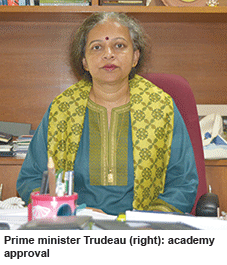 An alumna of Hyderabad University and the Indian Institute of Science, Bangalore, Dr. Leena Srivastava is the newly-appointed vice chancellor of TERI University, Delhi — India’s premier postgrad institution for environment and sustainable development studies. Dilip Thakore interviewed her over e-mail. Excerpts:
An alumna of Hyderabad University and the Indian Institute of Science, Bangalore, Dr. Leena Srivastava is the newly-appointed vice chancellor of TERI University, Delhi — India’s premier postgrad institution for environment and sustainable development studies. Dilip Thakore interviewed her over e-mail. Excerpts:
What are the main objectives for which Teri University (TU) was established?
TERI University was promoted to build capacity in India and beyond to comprehensively understand and address the sustainability challenges confronting all living beings in the world. These challenges are centred around climate change, water, energy, food and several other issues. We are among just a few institutions pioneering academic programmes in sustainability sciences, and have close collaborations with several leading institutions worldwide. TU also engages with the wider community of stakeholders — policy makers, corporates and civil society.
How satisfied are you with the progress of TU over the past two decades?
TU took off modestly at the turn of the century but acquired momentum after we moved to a new campus in 2008. Today, we offer nearly a dozen unique programmes including M.Tech, M.Sc, MA and MBA, on various facets of sustainable development. We have been awarded an ‘A’ grade by the National Assessment and Accreditation Council (NAAC) and our faculty is engaged in cutting-edge research on sustainability. Moreover, we have nearly 150 Ph D students pursuing research in TU.
Over a short span of time, we have signed key partnership agreements with some of the world’s top-ranked universities including Yale and Columbia in the US; Deakin, Queensland and Sydney universities in Australia; Utrecht University in the Netherlands, and Rheims University, France, among others.
Thus I am satisfied with our steady progress thus far. But we aspire to do much better in the years to come.
During the past 68 years since India attained independence, the ecology and natural environment of India has gone from bad to worse. To what factors do you attribute this phenomenon?
Several factors have contributed to the rapid deterioration of India’s environment and natural resources. While we have a robust legal and regulatory framework, inability to enforce compliance with regulations and penalising non-compliance has been a major drawback. This combined with an ill-trained, inadequate workforce, poor sensitisation of producers and consumers, weak incentive structures, inadequate financial allocations and a fragmented responsibility framework, are the major factors behind the despoliation of our ecology and environment
In particular, despite the subcontinent being blessed with several great river basins and systems, all of them are endangered and a national water crisis is imminent. What’s your comment?
It’s easy to blame successive governments for mismanagement of India’s water resources — enough storage capacity has not been created, integrated planning neglected and water conservation and usage efficiency haven’t been encouraged. However, an equal aggravator in this scenario is the lay citizen — the so-called educated urban citizen more than rural — who is not taking ownership of her living environment and resources. Industry too exploits the country’s natural resource base, in pursuit of narrow, short-term financial gains as if they are protected from the long-term consequences of their actions.
We need to build a strong coalition of all stakeholders to create a nationwide movement for water conservation and usage efficiency. This needs to be supplemented with technological solutions like water harvesting, recycling, treating etc.
The poor quality of primary-secondary education being dispensed in India’s 1.4 million schools is majorly responsible for ecology despoilment and the country’s deteriorating natural environment. Do you agree?
I would not place the responsibility for our deteriorating environment solely on our education system. The formal education system has to be supported by informal education.
I don’t believe that all polluters and authorities who aren’t doing their jobs are unaware of the consequences of their actions. But there’s a wilful disregard of consequences and an unwillingness to accept that each of our actions — no matter how small — can contribute towards the solution. Unless citizens change their mind-sets and attitudes towards the environment and natural resources, we will have no one but ourselves to blame for the loss of our ecosystem.
What are the future expansion and development plans of Teri University?
We want to increase TU’s impact on sustainability challenges facing the world by increasing the number and quality of our students. To this end, we will operationalise our campuses in Guwahati and Hyderabad at the earliest, and will be approaching corporate philanthropists to support us in this effort.
We also intend to substantially increase the number of international students to promote cross-learning because the sustainability challenges we are facing are global. We are reaching out to diverse donors to fund student scholarships to encourage this type of participation.